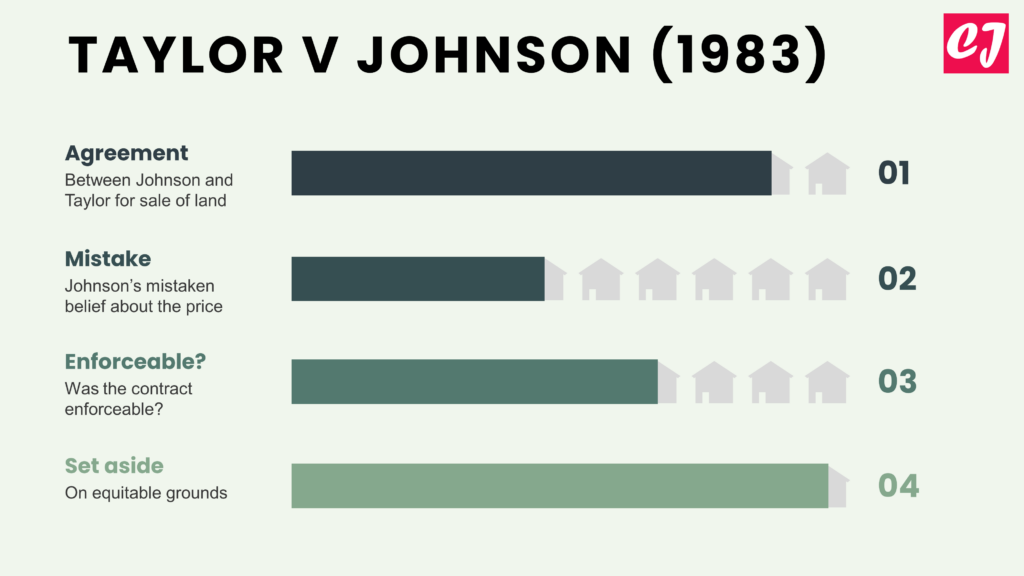
A Case Summary of Meehan v Jones (1982)
Case name & citation: Meehan v Jones [1982] HCA 52; (1982) 149 CLR 571
- The concerned Court: High Court of Australia
- Decided on: 17 September 1982
- The bench of judges: Gibbs C.J., Mason, Murphy and Wilson JJ.
- Area of law: Certainty; Contract of sale of land
What is the case about?
Meehan v Jones (1982) is a legal case that involved a contract for the purchase of land with a “subject to suitable finance being available” condition. Questions arose as to whether this condition made the contract unenforceable on grounds of uncertainty.
Facts of the case
There was an agreement between Meehan and Jones whereby Meehan agreed to purchase land from Jones. The agreement was subject to Meehan’s securing finance on satisfactory terms and conditions. But Meehan could not get the required finance he needed and as a result, the sale got delayed. Later Meehan said that he found satisfactory finance but Jones refused to complete the sale. Jones attempted to avoid the contract claiming that it was too uncertain because Meehan had complete discretion in deciding whether or not the financing terms offered to him were satisfactory.
What was the issue?
The main issue was whether Meehan’s discretion regarding the acceptability of financing terms rendered the contract unenforceable.
Judgment of the Court in Meehan v Jones
The Court took the following view:
Even though the buyer had the discretion to determine whether specific financing terms offered to him were satisfactory, this discretion was not completely unfettered. It had to be exercised honestly and reasonably, i.e., in accordance with good faith. Importantly, the Courts are quite capable of deciding whether the buyer has acted honestly and reasonably in his efforts to obtain suitable financing. Hence, the agreement was enforceable.
In general, Courts usually try to uphold agreements wherever possible. In cases like these, the “subject to finance” clauses are intended to protect the purchaser and may imply an obligation for the purchaser to act honestly and reasonably when attempting to secure finance. Further, many contracts depend on securing finance. But it does not make the contract void for uncertainty.
Quotes from the case
Mason J. said as under:
“Primarily the object of such a clause is to benefit or protect the purchaser, by ensuring that he is not under a binding obligation to complete if he is unable to obtain finance. …… The primary object of the condition being the protection of the purchaser, it is sensible to treat it as stipulating for finance that is satisfactory to the purchaser or his nominee, subject to an implied obligation that he will act honestly, or honestly and reasonably, in endeavouring to obtain finance and in deciding whether to accept or reject proposals for finance.” (at p588)
“To say that a “subject to finance” or “subject to finance on satisfactory terms and conditions” clause denotes finance which is satisfactory to the purchaser is not to say that he has an absolute or unfettered right to decide what is satisfactory. To concede such a right would certainly serve the object of the clause in protecting him. But it would do so at the expense of the legitimate expectations of the vendor by enabling the purchaser to escape from the contract on a mere declaration that he could not obtain suitable finance. With some justification the vendor can claim that the agreement made by the parties is not an option but a binding contract which relieves the purchaser from performance only in the event that, acting honestly, or honestly and reasonably, he is unable to obtain suitable finance.” (at p589)
Refer to the full text of the case here: https://jade.io/article/67012
Conclusion (Meehan v Jones)
From the above case, one might deduce that the “subject to finance” clause protects the purchaser, but it does not give them an unfettered right to decide what is satisfactory or to simply declare any financing terms as unsatisfactory to escape the contract. They must act honestly and reasonably when attempting to obtain suitable finance.
This approach balances the interests of both the seller and the purchaser.
List of references:
YOU MIGHT ALSO LIKE:
MORE FROM CONTRACT LAW:

